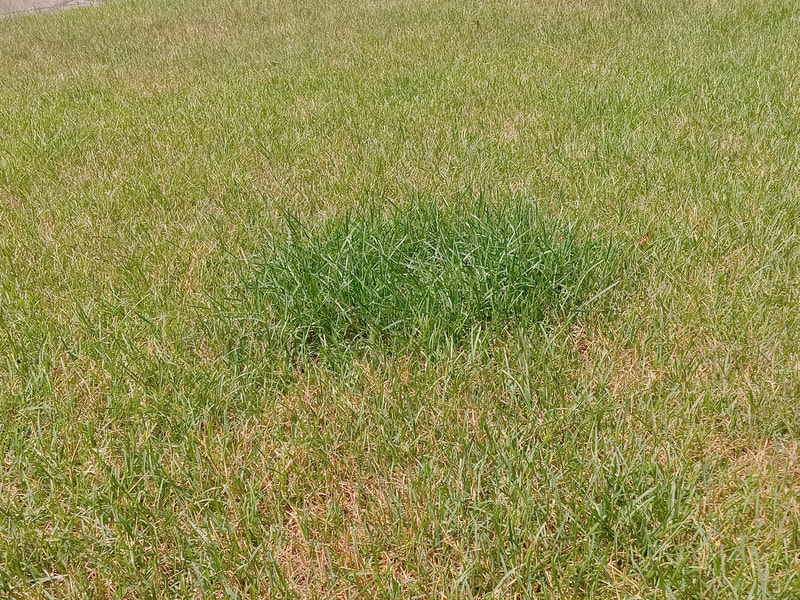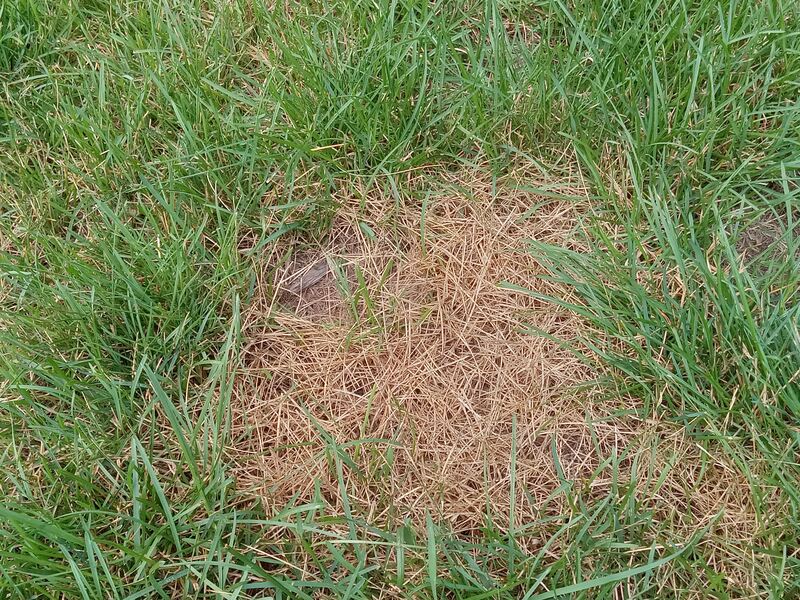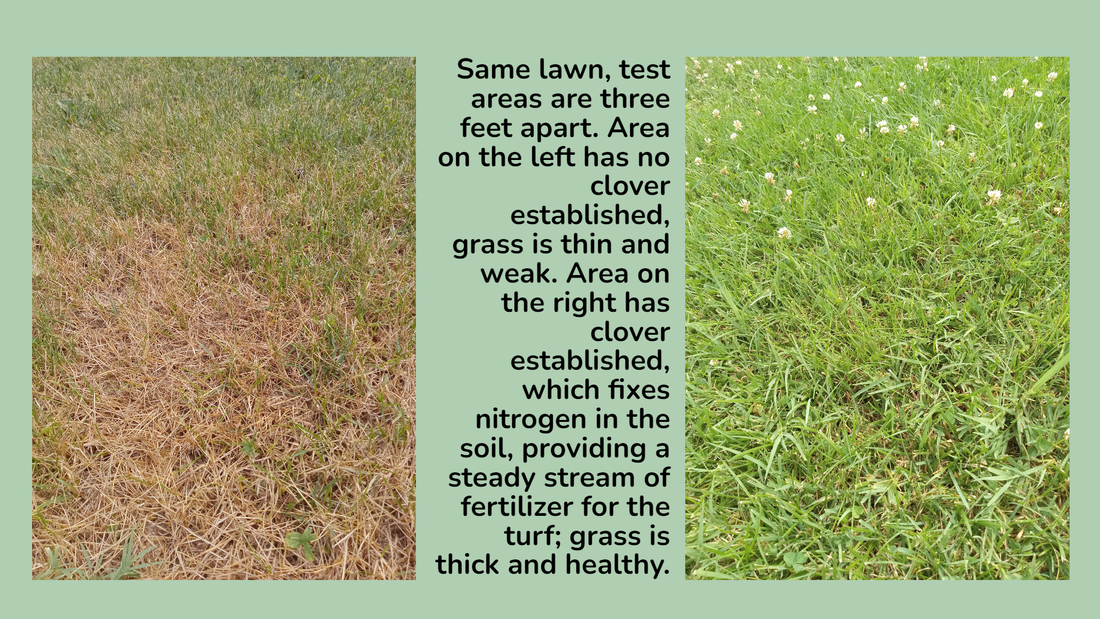 Learning to love your perfectly imperfect lawn is good for both you and the planet By Steve Veldheer Certified Lawn Care Manager If there’s one thing I try to convey to homeowners, it’s that you need to stop trying to attain perfection in your lawn. If you’re into natural yard care (which, let’s face it, if you’re reading this, you probably are), you just have to accept that nature’s idea of a healthy lawn isn’t the same as the lawn chemical industry’s. Unfortunately, since the 1950s, the only image of a beautiful lawn that we’ve been regularly given has been given to us by the chemical industry. Now, as an English major, I’m a guy who appreciates a good metaphor, especially when it comes to lawn care. So bear with me on this one; it’ll all work itself out in the end. Around 60 years ago, the world was introduced to the Barbie Doll. There’s no doubt that this iconic toy has had a huge impact on our society. Barbies allowed children to use their imaginations while dressing her up as an astronaut, surgeon, firefighter, engineer, reporter, Olympic athlete, and much, much more. But there’s also no denying that the original Barbie Doll has contributed to negative body image for generations of women (and men). When a plastic doll is held up as a standard of feminine beauty for more than a half century, while sporting unrealistic (and impossible) proportions– as well as a single skin, eye and hair color– it can create pressure on girls to look a certain way, and give both boys and girls unrealistic expectations. But it’s not just Barbie. Also contributing to these unrealistic expectations are magazine photos that have been retouched and photoshopped, actors’ bodies that have been enhanced with CGI technology, photo filters on our phones, and the selective lens of social media. When you boil it all down, corporate America has been feeding us unrealistic beauty standards for decades. And trying to meet these unrealistic standards can really take a toll on a person’s mental and physical health. If we saw a loved one regularly harming their body in an effort to meet these impossible physical standards, we would say something, right? Well, what if we saw someone harming the planet in an effort to meet unrealistic expectations in their lawn? It was actually around the same time that Barbie was introduced that chemical lawn companies began introducing the idea of a “perfect” monoculture lawn. Prior to World War II, all grass seed was sold with clover seed right in the mix. Did you read that?! Clover wasn’t a weed to despise! It was a natural part of having a lawn! And lawns were actually created as a space of leisure and relaxation, not of fretting and stressing over every flaw and blemish. After World War II, when the post-war economy was booming, men had more leisure time to hit the golf course, or catch a baseball game at the ballpark. It should come as no surprise that golf courses and ballparks were the first places the chemical lawn companies targeted with their weed killers and granule chemical fertilizers. As those places began producing carpet-like monocultures with their turfgrass, those fellas golfing and relaxing at the ballpark began pining for such a lawn in their own yard. And the chemical companies were more than happy to oblige. And thus began a nearly 80-year run of tons and tons of toxic chemicals being dumped onto American yards, all to support unsustainable and dangerous monocultures. Now I’m not saying that we should just ignore our lawns, and let nature do its thing– whatever that may look like. Just like I’m not saying it’s bad to exercise, eat right and do other things to make ourselves look nice. But at the end of the day, if our only standard of beauty is Barbie (or Chris Hemsworth as Thor, the god of thunder), and we’re actively harming ourselves mentally and physically to achieve that level of beauty, something needs to change. Likewise, if your standard of beauty for your lawn is a thick monoculture that stays dark green from April through November, you may need to change your standards. Changing expectations isn’t the same as lowering expectations. Be happier with the lawn you have, instead of being upset that your lawn doesn’t look like the picture on the bag of Scotts Weed n Feed. Here are some things you can do to be happier with your lawn: 1. Realize that turfgrass in Michigan goes dormant in the hot summer months. If it’s brown or weak-looking, it’s because the type of grass we have in northern climates doesn’t naturally grow or stay green when temps regularly go above 75 or 80 degrees. Don’t judge your lawn in the summer; it’s not at its peak performance. Spring and fall are when it looks its best. 2.Water your grass in the morning, as early as possible, for at least 30 minutes, as needed. In the hot summer months, you could go as long as 45 or 60 minutes per watering, especially if you have sandier soil. Watering in the morning is important to prevent fungus from getting out of control (which is what can happen if you water in the evening). You don’t typically need to do much watering in the early spring or fall; the rain and cooler temps will keep your grass green. Never let it go more than 14 days without water in the heat of summer. 3.Accept a certain amount of diversity in your lawn. A monoculture is unnatural. Nowhere in nature will you find 6,000-20,000 square feet of only one type of plant growing. If your aim is a natural lawn, it’s going to have diversity in it. Period. A lawn with clover in it stays greener all summer. A lawn with ONLY grass growing in it is more susceptible to grubs, disease, fungus and other problems. 4. Limit the amount of diversity in your lawn by doing two things regularly: Pull weeds you really don’t want, and overseed your entire lawn in early-fall (and/or in the spring). Use a sun/shade mix of grass seed to fill in gaps where weeds may otherwise pop up. Even better? Throw down some Dutch white clover seed with your sun/shade grass seed. Like I mentioned above, the grass around clover stays greener all summer long. How? It pulls nitrogen out of the air and deposits it into the soil– nitrogen is a nutrient that greens up your turf. 5. Add organic matter to your turf regularly. We’ve become so focused on putting down nitrogen (thanks, chemical lawn industry), that we overlook one of the most important things a healthy lawn needs: Organic matter in the soil. Organic matter holds onto water, loosens up compacted soils, and locks in nutrients for when your turf needs them. You can add organic matter by top-dressing with compost annually, or applying our Alfalfa Blend Lawn Fertilizer. 6. Be patient. Offer your lawn some grace. Nature doesn't do things quickly, and it doesn't always do what we want. But if we want a natural lawn, we have to accept that we can't control nature, we can only work with the processes that God has put into place, and that might mean we don't get instant results, or it might mean some months look better than others. Lawns, like people, are healthiest when we finally learn to embrace those imperfections. We can be happier when our standard of excellence isn’t Barbie or Chris Hemsworth or our college friend who only posts the highlights of his life through wrinkle-masking filters on Instagram, or if our standard of excellence isn’t the outfield turf at Comerica Park. The grass may sometimes be greener on the other side of the fence, but that doesn’t mean it’s better or healthier. When it comes to setting standards for our lawns, we should set them; we shouldn't let Scotts or our neighbors do it for us.
0 Comments
Dogs love fertilizing lawns. They just don' t know when to quit. Here's what you can do to help.7/12/2022 Those of us with dogs know how hard it can be to keep the grass looking nice in the "potty area" of the yard. Female dogs especially are notoriously damaging to turf.
The question, though, is why? Female dogs, as well as some young males, senior males, and males who just never got the urge to lift their leg to pee, squat and deposit their urine directly into the turf. Males who lift their leg typically spread their pee around the yard, and actually pee on something like a tree or landscaping. So the yards where male dogs are peeing a little here and there typically don't see as much "urine burn" on the grass. But let's talk about the yards where dogs squat and pee right into the turf. A common misperception is that those urine burns come from the acidity in the dog's pee. And while urine is acidic, that's not actually what's causing the burn. It's actually nitrogen. Urine is pretty high in nitrogen, so what your dog is doing is fertilizing your grass whenever she pees. the problem is that she just doesn't know when enough is enough. With a female dog (or male dogs who squat to pee), there's a chance you've got some very lush-looking spots in your yard mixed in with some very dead-looking spots. The lush spots are where the dog's done some great work putting nitrogen into the soil. The dead spots are where she's overdone it. Either way, most of us don't want such uneven turf in our yard; we'd prefer a bit more uniformity. So what can you do about fixing this unevenness in the turf? First, don't waste your time and money on pills that claim to eliminate turf burn. They're just not effective. If anything, you could reduce the amount of protein in your dog's diet, as high-protein means higher nitrogen in the pee. That being said, there's still going to be nitrogen potentially burning your grass no matter how much you reduce the protein in her diet (and dogs do need protein, so you don't want to eliminate it altogether!). The more sustainable fix is to increase the frequency of your watering in the potty area. Normally, I suggest less-frequent but deeper waterings for your lawn, but when it comes to your dog's potty area, I suggest watering for 3-5 minutes every 1-2 days (you should also continue doing a deeper watering every 7 to 10 days). Even if you don't want to turn the sprinkler on for that short of a period, just put a spray nozzle on your hose and spray it down for a few minutes, giving a bit more attention to the specific spot where your dog recently peed. These frequent short waterings will help disperse the urine into the soil and dilute the nitrogen so you won't be facing so much unevenness or dead spots in your turf. 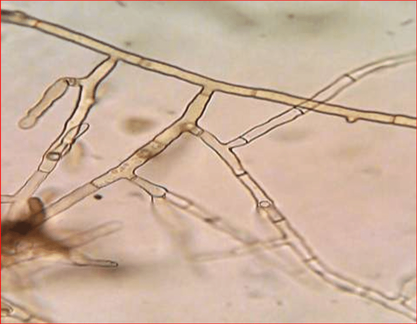 Rhizoctonia solani Rhizoctonia solani A recently-released study from an international group of scientists and researchers (link to PDF) shows that vermicompost (compost produced by worms) not only improves crop productivity, but actively fights fungal attacks that can destroy harvests. This is great news, not only for organic farmers, but also home gardeners who are looking to boost their harvest and prevent fungal outbreaks without using harmful synthetic fungicides and fertilizers. Their scientific conclusion: "The application of vermicomposting to agricultural land increases productivity by a multifaceted impact on soil health and crops, facilitating nutrient enrichment and preventing pathogen development. Vermicompost and its derivatives, such as vermiwash [liquid extract produced from earthworm-rich vermicompost], along with associated decomposer bacteria, act against fungal pathogens. The antifungal efficacy of vermicompost may be associated with bioactive compounds present in the CF [coelomic fluid], mucus, skin secretion of earthworms and metabolites secreted by decomposer bacteria. The CF of earthworms has an inherent ability to defend worms against diseases. It inhibits the growth of a variety of fungal pathogens, such as Rhizoctonia solani, Alternaria solani, Aspergillus niger, A. flavus, Fusarium oxysporum, and F. graminearum. The metabolites from vermicomposting bacteria, CF, mucus, and skin secretion synergistically combat phytopathogenic fungi. As an organic product, vermicompost and its derivatives are environmentally friendly. Thus, these products should be used to boost agricultural productivity by nutrient enrichment and reduction of plant fungal diseases." The layperson's summary: Worms which break down organic matter have to be able to fight off harmful bacterial and fungal pathogens in the soil, so they secrete fluids from their bodies to do this. These fluids are also present in the vermicompost (their poop) that we apply to the soil in our pots and gardens. Therefore the study shows that because of the composting worms' fluids present in the vermicompost, their vermicompost also acts as an antifungal agent for your plants. To order Living Worm Compost for your garden and potted plants, click here. 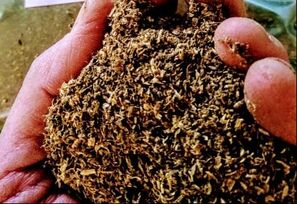 Organic alfalfa meal Organic alfalfa meal The ideal time to prepare your garden beds for spring planting is in the fall. Yes, you read that right! Preparing your garden beds for next year starts as soon as the season ends. Start by cutting down this year’s crops. Dispose of diseased plants and compost healthy ones. Then, Alfalfa meal is a natural soil amendment that I add to my garden each year. Mix 5 pounds per 100 square feet of garden space before adding Living Worm Compost. Vermicompost is more nutrient dense than traditional compost and can fill the gaps of nutrients that may be missing in your soil. One bag per 100 square feet of garden space is a good place to start. Healthy soil in the fall means healthy plants that will produce good crops and help fight off disease in the spring. At Good Sweet Earth, we're big fans of clover in lawns (see: here & here). It fills in gaps and keeps out less attractive weeds, it stays green all summer, it's great for pollinators, it's good in high-traffic areas, but one of the best parts is that it actually puts nitrogen into the soil. It provides fertilizer naturally for your lawn. From the University of Georgia Extension: Nitrogen is "fixed" in clovers through a symbiotic relationship with Rhizobium bacteria that infects the plant's roots. The plant provides energy for the bacteria, and bacteria provide the "machinery" necessary to convert atmospheric nitrogen into a form available to plants. Nitrogen fixation is one of many economically important features of clover, particularly when clover represents a substantial proportion of available forage. A vigorous stand of white clover will fix 100-150 pounds of nitrogen per year depending on soil and growing conditions But what does nitrogen fixing actually mean for your lawn? It means that in areas where you've got clover growing, your grass will be healthier too-- greener, thicker and stronger in drought conditions. Take a look at the lawn below where Dutch white clover is currently being established. The test sample on the right, with clover currently fixing nitrogen in the soil, shows shows thicker, greener turfgrass, even during the heat of summer months.
|

